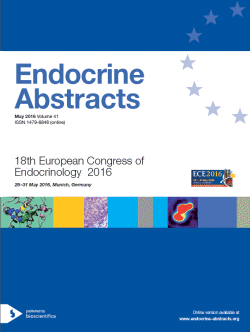Searchable abstracts of presentations at key conferences in endocrinology
Symposia
New Developments in subclinical thyroid disease
ea0041s11.1 | New Developments in subclinical thyroid disease | ECE2016
Thyroid function and aging: what can we learn from animal models?
Since thyroid hormone is a key regulator of metabolism, changes in thyroid hormone signaling have widespread effects. Thyroid state changes during aging and vice versa lifespan is affected by thyroid state. However, underlying mechanisms remain elusive. DNA damage importantly contributes to the process of aging, as underscored by premature aging syndromes caused by defective DNA repair.In different mouse models of premature (DNA-repair deficient animals)...
ea0041s11.2 | New Developments in subclinical thyroid disease | ECE2016
Subclinical thyroid disease and clinical outcomes: lessons from large individual participant-based analyses from the Thyroid Studies Collaboration
To clarify the risks associated with subclinical thyroid dysfunction, we built in 2008 the Thyroid Studies Collaboration and collected into individual participant data from 70 000 participants from 17 prospective cohorts. We first clarified the risks of coronary heart disease, heart failure and mortality and assessed the contribution of autoimmunity on the risks of cardiovascular diseases. We also assessed the risk of stroke associated with subclinical thyroid dysfunction. The...
ea0041s11.3 | New Developments in subclinical thyroid disease | ECE2016
Subclinical hypothyroidism: when should we start treatment?
Subclinical hypothyroidism (SCH), defined as a state of elevated TSH concentrations in the presence of normal free thyroxine and triiodothyronine concentrations, can be mild or severe according to the extent of TSH increase. The disease may be progressive or regressive, while the main cause of SCH is chronic autoimmune thyroiditis. However, treatment of SCH remains controversial, levothyroxine being the treatment of choice. It should be initiated in pregnant women and in patie...




